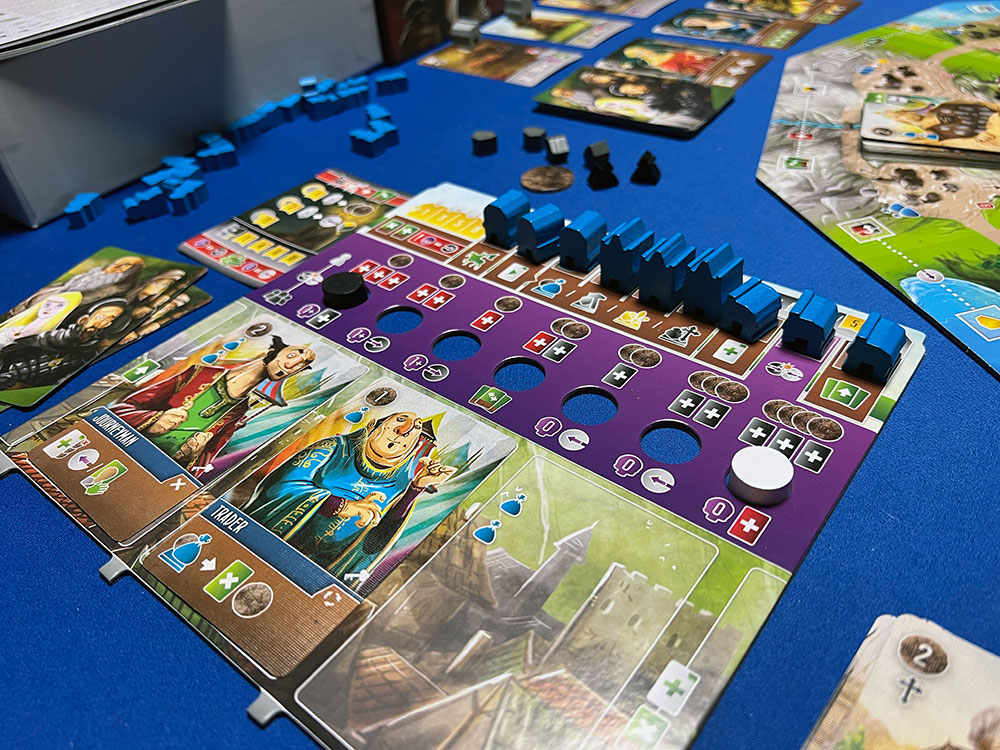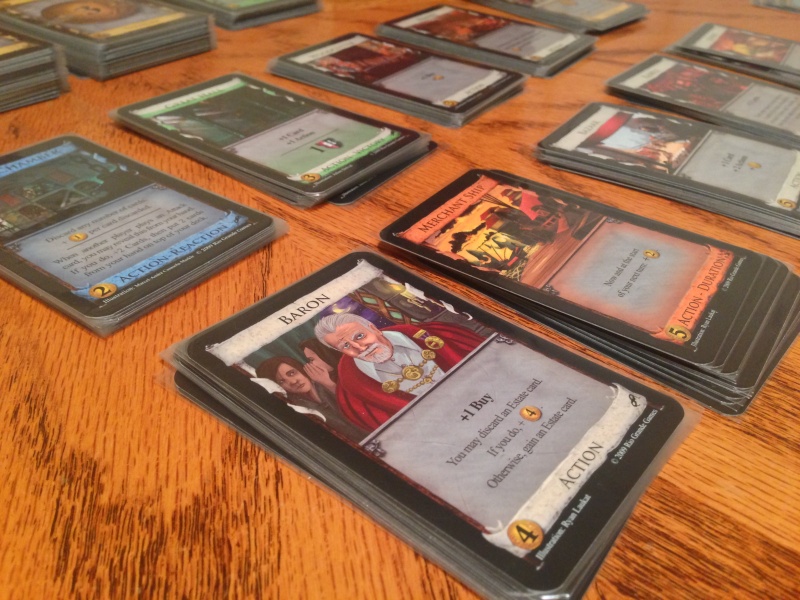 There are two expansions for
There are two expansions for Architects Viscounts of the West Kingdom. I am reviewing both today. There is no time to waste with a witty opening.
Yes, I poached this from my Architects of the West Kingdoms expansion reviews intro.
Expansion Overviews:
The Keeper of Keys expansion adds the following:
- 4 player boards (cardboard with holes for the corruption and virtue markers)
- 20 neutral townsfolk cards
- 12 updated starting townsfolk cards (3 for each color)
- 10 hero townsfolk cards
- 5 player cards
- 18 chest tiles
- 5 manuscripts
- 3 public buildings and 3 public building cards
- Solo materials:
- 1 scheme card and 3 AI chest tiles
The Gates of Gold expansions adds the following:
- 4 manuscript boards
- 24 outsider cards
- 24 king’s order cards
- 28 neutral townsfolk cards
- 5 hero townsfolk cards
- 6 diversified builder cards
- 6 specialized builder cards
- 6 castle leader cards
- 5 manuscripts
- Solo materials:
- 1 AI reference card

Game Experience with the Expansions:
Keeper of Keys
Of the two expansions, I SLIGHTLY prefer Keeper of Keys. The additions are easier to incorporate into the base game while not increasing the complexity of the game. It includes my favorite addition to Viscount—the ability to add heroes to your deck. I was disappointed when I played base Viscounts and was only able to include the hero you draft at the beginning of the game. Heroes have more interesting icons and powers compared to the neutral townsfolk and can really impact your long-term strategy. They can now be added to your deck either by one of the new player cards or through a new effect that adds them directly to your hand (you choose your hero from one of the three face-up heroes in the new hero line set up next to the board.)

Second, I appreciated the new player boards. It is nice to have holes in the cardboard to hold the corruption and virtue markers. It also includes slots below the townsfolk spaces to hold a chest. Wait… chests? Yes, you can now earn chests! (I am not sure why that is exciting.) Chests can be earned from a new effect that allows you to take a face up chest tile and place it below one of the townsfolk spaces. During the game, if a card is placed or moved into a space that matches the icon symbol on the chest below it, you will gain either an immediate effect, such as money, or a bonus during your turn, such as allowing a Builder symbol to count as 3 Merchant icons. Also, at the end of the game, you will score points based on the number of chests you collected. Chests add another layer of strategy that I really enjoyed without complicating the game.
Finally, there are three public buildings. If you are on a space where you previously constructed a Workshop/Trading Post/Guildhall, you can replace it by building the public version of that same building and placing your previously constructed building back on your player board. Why would you do this? End game points, an immediate one-time bonus, and an ongoing bonus for the rest of the game. While this addition is the least impactful of the three, it repeats a theme throughout this expansion—additional strategy consideration while being easy to integrate.
My only issue with the expansion is that I wish it had also included recessed spaces to hold the unbuilt buildings. The holes solved one-half of the problems with components shifting on your player board. I wish the buildings had been addressed as well.
Gates of Gold
This expansion is slightly more complicated to add to the base game. The biggest, and most complex addition is the king’s orders and outsider cards. King’s orders are a new type of card. It is like a townsfolk card, but when it drops off your player board, the player must take one of the faceup outsider cards and add it to their discard for free. Each outsider card adds an end-game scoring condition (as well as a 3 movement value and icons). If you destroy a king’s order card, you get to remove one of the outsider cards and resolve the effects of removing the card.

The second addition is the manuscript boards. These serve two purposes. First, it adds additional abilities for transcribing manuscripts. The first time you transcribe a silver/black/blue/yellow, you unlock an ability for the rest of the game, such as spending 2 silver to draw a card. The second purpose is to help you organize your manuscripts so you can more easily tell how many sets you have. I liked this board because it added more strategy to acquiring manuscripts. The abilities are not overly powerful, but you may search for a specific color manuscript not to complete a set but to unlock a power.
The final addition of three types of bonus cards, two of which are new. Players will now get an ongoing bonus for being the first to either build one of each building or all three of the same building. There are six of each type, so the bonuses will be different for each game. Finally, the leader card for being the player with the most workers in the castle has been replaced with six new cards (one is the same as the base game) to add variability to the bonus earned. I really liked these as they added additional bonuses/variability for constructing buildings and pursuing populating the castle with workers.

My only issue is that the additions are slightly more complicated to add to your game compared to Keeper of Keys. King’s orders/outsider cards add two types of cards for the purpose of adding outsiders to your deck. I feel the mechanism for adding a hero to your deck from Keeper of the Keys is more elegant. You need a new manuscript board for the powers vs. the improved player board already having space for the chests.
Final Thoughts:
I really liked both expansions. Similar to my Architects expansion review, I would recommend picking up both if you can, especially if you already like Viscounts of the West Kingdom. They both make a great game even better.
Yes, I poached this from my Architects expansion review final thoughts.
That being said, if you only want one expansion, I recommend Keeper of Keys. It adds the ability to add heroes to your deck, which I really wanted from the base game. I also enjoyed the chests and the bonuses they provided. Also, it is easier to integrate into your base game.
 Keeper of Keys
Keeper of Keys
Hits:
• Adding heroes to your deck
• Chests add an additional strategical consideration
• Easy to integrate
Misses:
• Player boards not being recessed for buildings
 Gates of Gold
Gates of Gold
Hits:
• Outsiders add an additional way to score points
• Manuscript board adds additional powers
• Builder and Leader cards add more abilities
Misses:
• Not as easy to integrate






















